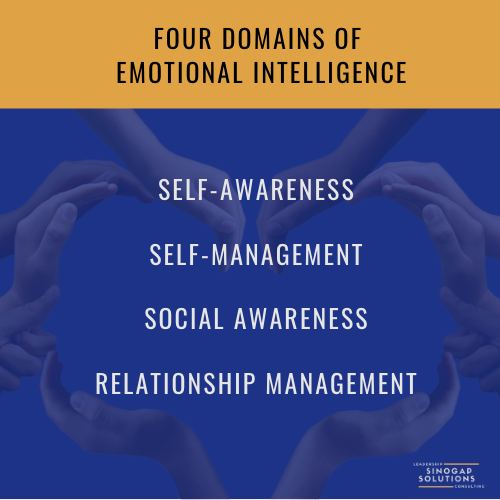Copywriter & Chief Editor | Asyah Saif | Grammatica Communications Ltd.
We believe that you can’t necessarily talk about self-awareness without talking about emotional intelligence. Our business model at Sinogap Solutions is built on the psychological concepts that lie behind emotional intelligence. When we explore emotional intelligence, we are really looking at what our values are, where we may be vulnerable and how we can be authentic in that vulnerability, and how our mindset influences how we perceive and present ourselves.
Brave Spaces and Emotional Intelligence
Emotional intelligence refers to our ability to perceive and manage our emotions, which is critical when stepping into situations that require courage. Brave leaders are emotionally intelligent people that are attuned to their own emotions and the emotions of those around them. When we are able to manage our own emotions, we are able to positively influence the emotions of others.
Emotional intelligence doesn’t just help us become better leaders, it equips us with the capacity necessary to learn how to become better leaders. This can manifest in formal leaders supporting their team to achieve positive outcomes for the organization, and in formal and informal leaders fostering a brave space.
How Do Managers Learn To Be Effective Managers?
This is a question that Dr. Johanna Pagonis had during her research. The research didn’t start off with interest in emotional intelligence, but as she collected data through interviews and observations of different managers in the field, she started seeing some trends in qualities that they shared. When exploring those trends, the four domains of emotional intelligence emerged. Research participants never used the term emotional intelligence; however, that was exactly what they were doing and describing.
These four domains that came out of Dr. Pagonis’s research align with some of the most recent discoveries that Danielle Goleman, Richard Boyatzis, and Annie McKee share in their Primal Leadership book and Resonant Leadership by Boyatzis and McKee.
Four Domains of Emotional Intelligence
The first two domains are about understanding yourself, your emotions, and how you can regulate those emotions.
The third and fourth domains are about your ability to be aware of and identify the emotions in other people, their experiences, and their perspectives. They are about making space in your life to be able to listen to and hear what others have to share. This involves creating a workplace environment—like a brave space—to encourage other people to bring their very best and help them regulate their emotions.
First domain: self-awareness:
This reiterates self-awareness as a foundation to emotional intelligence. It consists of having a clear understanding of what your purpose is, or what we call your anchor is. Your anchor grounds you, centers you, and during really difficult times reminds you why you’re here and why you do what you do.
Self-awareness also involves knowing what your values are, which we refer to as your lighthouse. Your lighthouse guides you in the direction you need to move forward to get to land safely or make a decision that will lead to a positive outcome.
Your anchor and your lighthouse guide you to help you achieve success in your life.
Second domain: self-management:
Knowing your anchor and your lighthouse is important, but it is also important to understand your strengths, your areas of growth, and your emotional triggers. What triggers you, and how aware are you of what those triggers are? How can you exert self-control in challenging or high stress situations?
Third domain: social awareness:
This domain is all about empathy and understanding the purpose and values of your organization. While self-awareness is about understanding your own values and purpose, social awareness is about understanding the values and purpose of your organization. Social awareness is also about being able to understand other people’s perspectives by demonstrating empathy.
The superpower behind empathy is being able to really listen. This can involve temporarily suspending your judgment and your biases so that you can fully listen to what other people are sharing. If you can do that, you can start to develop positive bonds with others that are built on a strong foundation of trust.
Fourth domain: relationship management:
This domain includes being able to inspire others and work through conflict, which involves understanding that conflict, if leveraged correctly, can lead to better outcomes and solutions to problems. Relationship management is about leading with the heart and not just the manager hat around budgets and quarterly targets. It involves connecting with your people and knowing who they are. It is about placing importance on others’ welfare rather than just focusing on policy and strategy. This can look like investing in other people’s development to build on their strengths.
Interested in learning more about emotional intelligence? Explore our Emotionally Intelligent Leader course. You can also explore the concept of self-awareness and emotional intelligence through our Creating Brave Spaces

